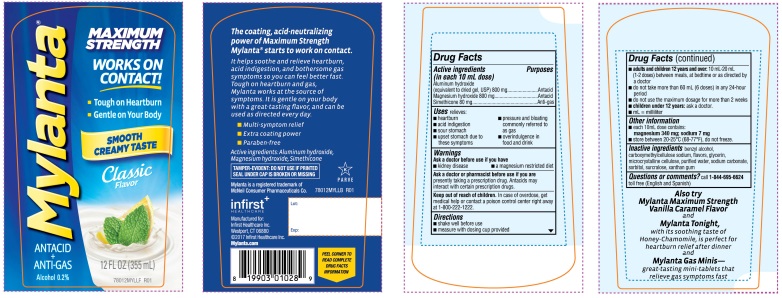
Mylanta Maximum Strength Classic Flavor while Breastfeeding
What is Mylanta Maximum Strength Classic Flavor used for?
Brief: Antacid Antacid Anti-gas
What are the risk associated with Mylanta Maximum Strength Classic Flavor usage while breastfeeding? What precautions shall I take while using it in breastfeeding?

Mylanta Maximum Strength Classic Flavor Breastfeeding Analsys
Aluminum hydroxide while Breastfeeding
SafeCAS Number: 21645-51-2
Aluminum does not concentrate into breast milk. After ingestion of antacids the Aluminum plasma levels increase from a basal-point of 7 μg/L to 55 μg/L at half-an-hour with a return to previous level 3 hours later. Although a minimal amount of Aluminum may be found in the milk, there are not shown side-effects in the infant. Mother's milk has a mean concentration of 49 μg/L of Aluminum which is much lower than the amount of 180-700 μg/L found in artificial formulas. Because of a low oral bioavailability the pass from the breast milk toward the infant's plasma is hampered, except in premature and newborn infants who may exhibit a higher intestinal absorption due to an increased permeability. Avoid chronic or excessive use. WHO Model List of Essential Medicines 2002: compatible with breastfeeding.
Magnesium hydroxide while Breastfeeding
SafeCAS Number: 1309-42-8
Ingested Magnesium does not concentrate into breast milk.. Naturally occurring, the mean Magnesium concentration in the milk is 31 mg/L (range 15 – 64 mg/L) and not affected by the ingestion of Magnesium. Because of a low oral bioavailability the pass from the breast milk toward the infant's plasma is hampered, except in premature and newborn infants who may exhibit a higher intestinal absorption due to an increased permeability. Avoid chronic or excessive use. WHO Model List of Essential Medicines 2002: Magnesium hydroxide is compatible with breastfeeding.
Dimethicone while Breastfeeding
SafeCAS Number: 9006-65-9
Dimethicone is a fluid type of silicone with a methyl as organic group radical. Silicones are polymers of silicon tied to oxygen atoms with high molecular weight (see information on silicone and dimethicone). Dimethicone is water repellent and it is used in creams, dressings for skin protection and pediculicides. An activated form of Dimethicone is Simethicone that is used for treatment of flatulence (see info on Simethicone) At latest update, relevant published data on excretion into breast milk were not found. Because it is not absorbed through the skin or orally along with a high molecular weight, excretion into breast milk in significant amount or absorption by the infant gut is highly unlikely. See below the information of these related products:
Mylanta Maximum Strength Classic Flavor Breastfeeding Analsys - 2
Magnesium hydroxide while Breastfeeding
CAS Number: 1309-42-8
A study on the use of magnesium hydroxide during breastfeeding found no adverse reactions in breastfed infants. Intravenous magnesium increases milk magnesium concentrations only slightly. Oral absorption of magnesium by the infant is poor, so maternal magnesium hydroxide is not expected to affect the breastfed infant's serum magnesium. Magnesium hydroxide supplementation during pregnancy might delay the onset of lactation, but it can be taken during breastfeeding and no special precautions are required.
What should I do if already breastfed my kid after using Mylanta Maximum Strength Classic Flavor?
As usage of Mylanta Maximum Strength Classic Flavor is mostly safe while breastfeeding hence there should not be any concern. In case of any change in behavior or health of your baby you should inform your health care provider about usage of Mylanta Maximum Strength Classic Flavor else no further action is required.
I am nursing mother and my doctor has suggested me to use Mylanta Maximum Strength Classic Flavor, is it safe?
Definitely, Mylanta Maximum Strength Classic Flavor is safe in lactation for baby. No wonder your doctor has recommended it.
If I am using Mylanta Maximum Strength Classic Flavor, will my baby need extra monitoring?
No extra baby monitoring required while mother is using Mylanta Maximum Strength Classic Flavor
Who can I talk to if I have questions about usage of Mylanta Maximum Strength Classic Flavor in breastfeeding?
US
National Womens Health and Breastfeeding Helpline: 800-994-9662 (TDD 888-220-5446) 9 a.m. and 6 p.m. ET, Monday through Friday
UK
National Breastfeeding Helpline: 0300-100-0212 9.30am to 9.30pm, daily
Association of Breastfeeding Mothers: 0300-330-5453
La Leche League: 0345-120-2918
The Breastfeeding Network supporter line in Bengali and Sylheti: 0300-456-2421
National Childbirth Trust (NCT): 0300-330-0700
Australia
National Breastfeeding Helpline: 1800-686-268 24 hours a day, 7 days a week
Canada
Telehealth Ontario for breastfeeding: 1-866-797-0000 24 hours a day, 7 days a week
